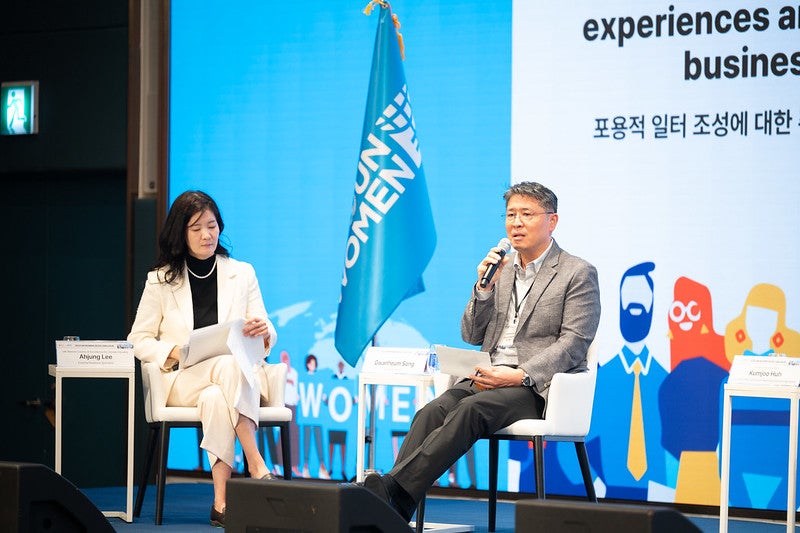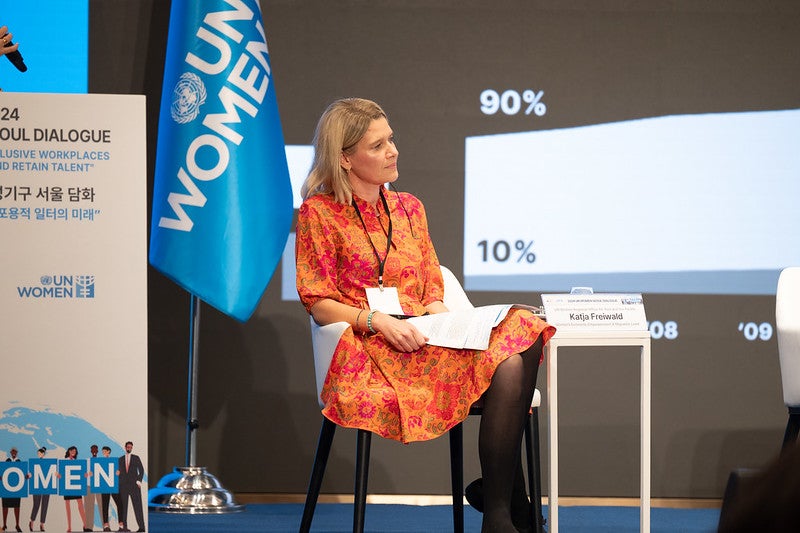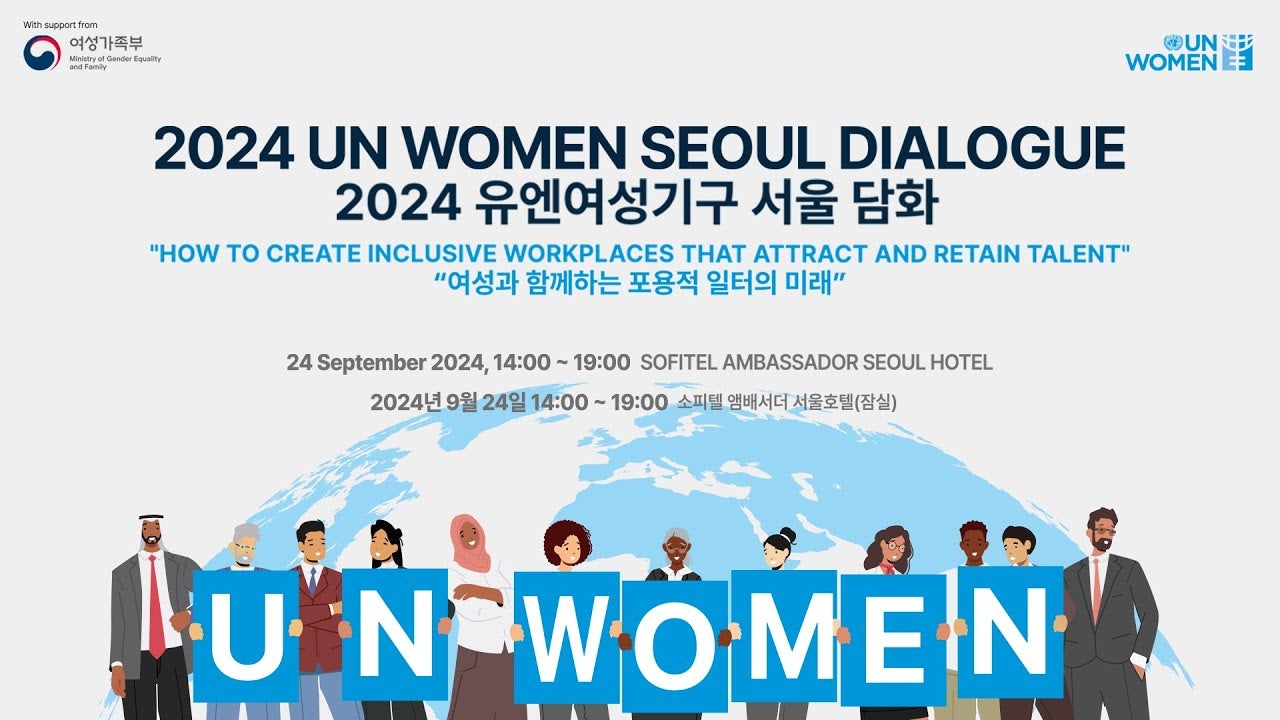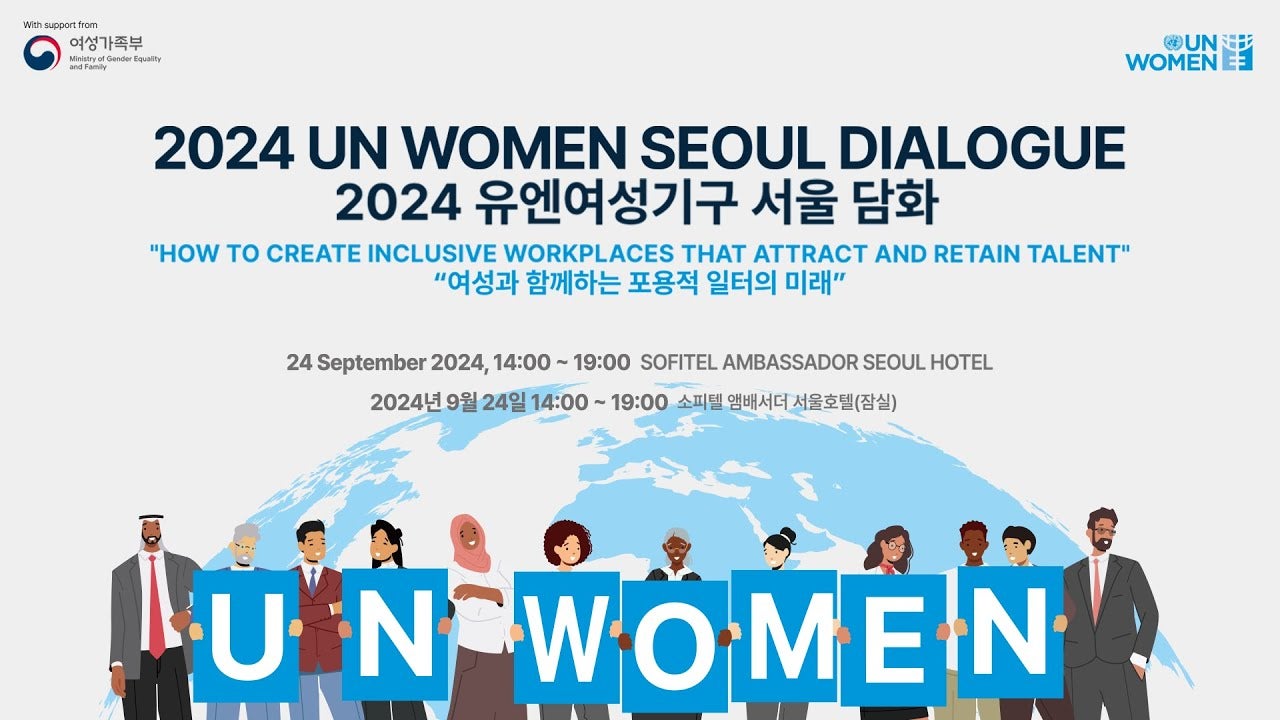English | 한국어
Seoul, Republic of Korea — On September 24, the UN Women Centre of Excellence for Gender Equality (the Centre) hosted the 2024 UN Women Seoul Dialogue in the Republic of Korea (ROK) under the theme, "How to Create Inclusive Workplaces that Attract and Retain Talent." Building on last year’s focus on key industries, this year’s dialogue brought together over 200 private sector participants to explore practical strategies for creating workplaces where women can join, thrive, and advance.
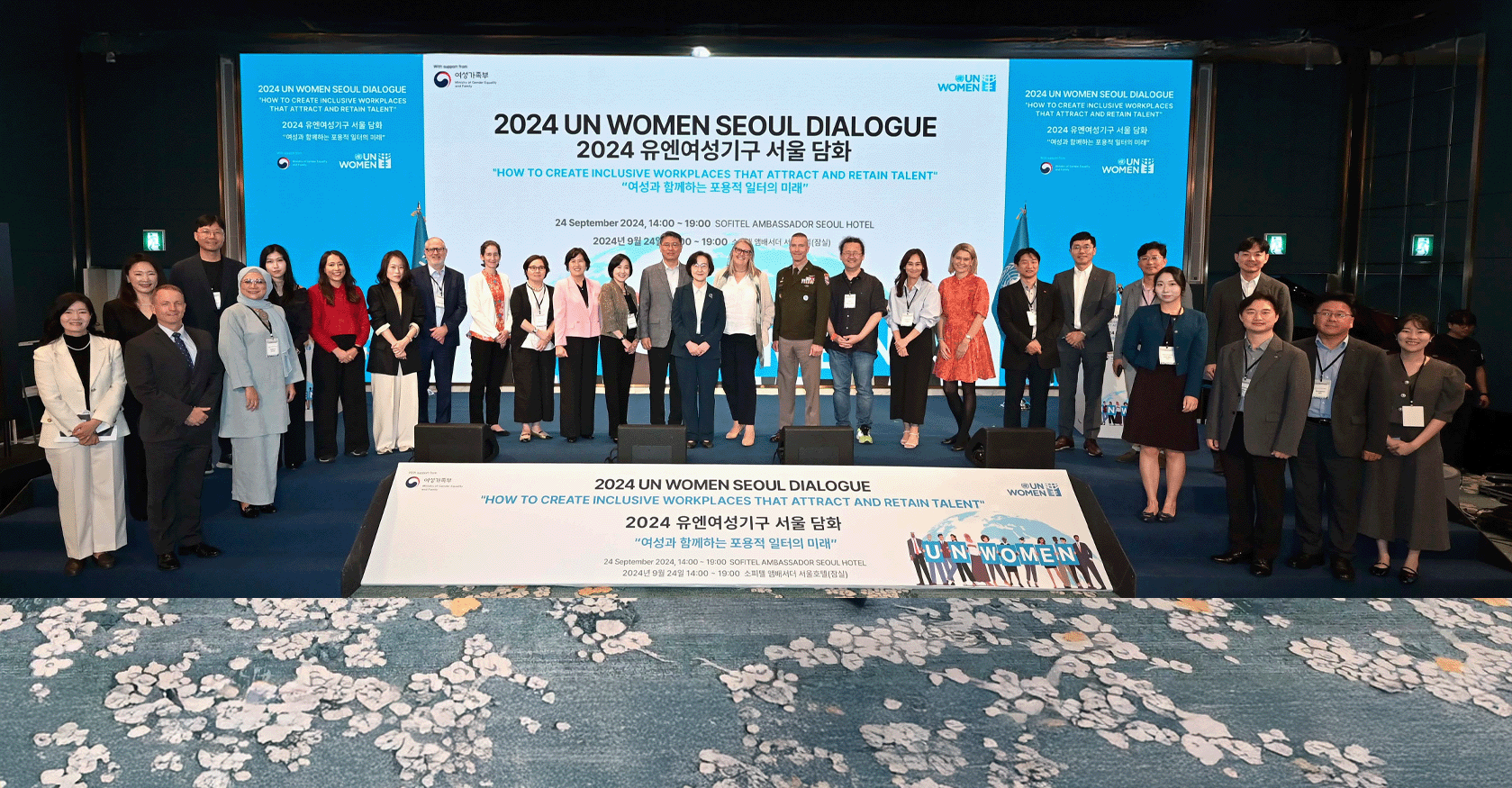
Participants in the 2nd UN Women Seoul Dialogue: ‘How to Create Inclusive Workplaces that Attract and Retain Talent’ hosted by UN Women Centre of Excellence for Gender Equality in the Republic of Korea. Photo: UN Women/Hwang Chang Kyu
Opening the event, Jeongshim Lee, Director of the Centre highlighted the importance of gender equality in achieving the Sustainable Development Goals (SDGs) by 2030, and noted that "gender equality is essential for boosting corporate competitiveness." In her congratulatory remarks, Michelle Winthrop, Ambassador of Ireland to the Republic of Korea, stressed: “Evidence suggests if you can [help] women through [the] tough years [of pregnancy and childcare], you buy an additional 15-20 years of high-performing talent. Otherwise, they are lost forever.” She also argued that: "We need to make it acceptable for women to harbour professional ambition and still be good moms.”
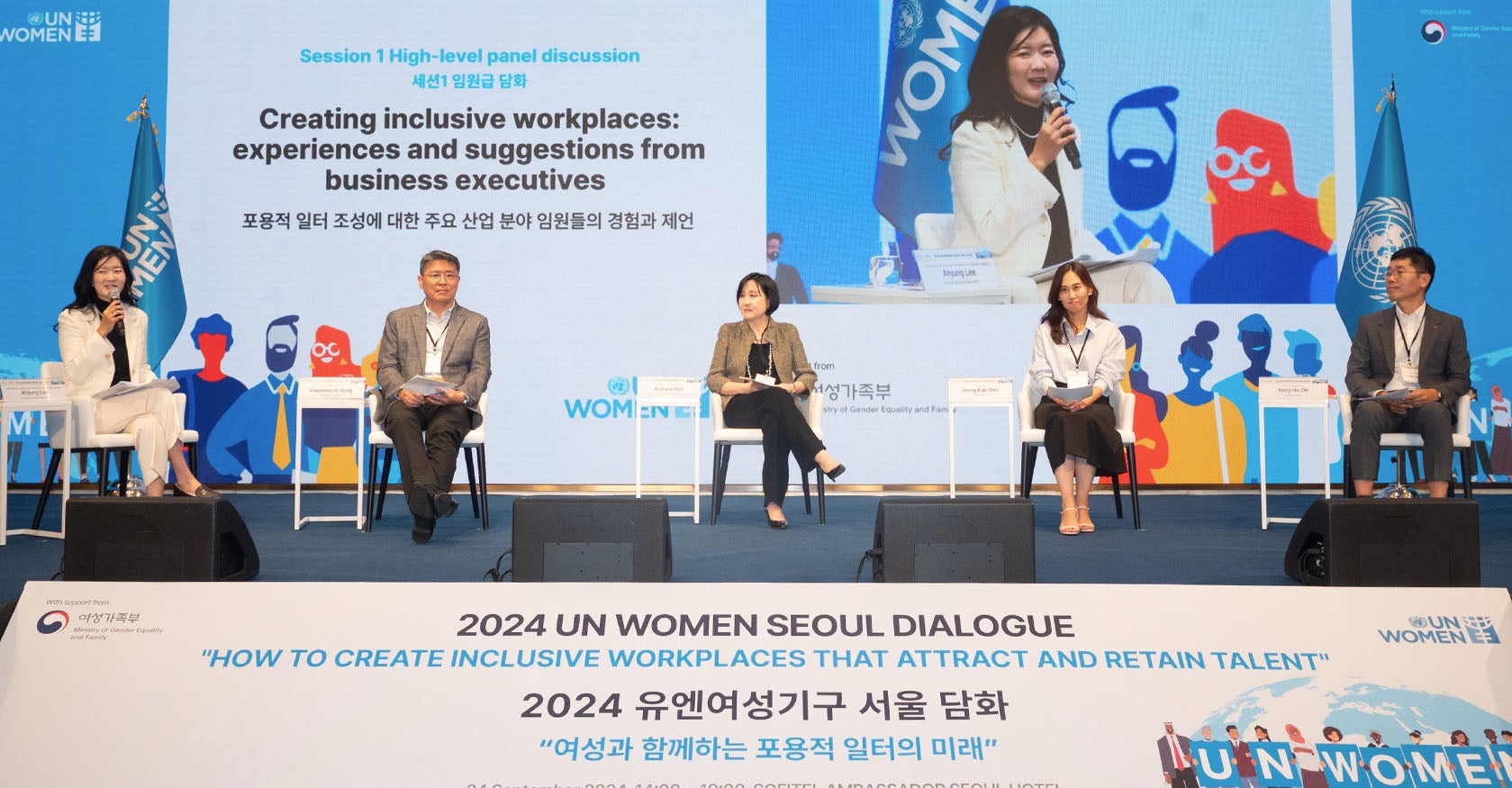
(from left) Ahjung Lee, External Relations Specialist, UN Women Centre of Excellence for Gender Equality; Gwanheum Song, Managing Director, Body, Exterior and Chassis Engineering function, GM Korea; Kumjoo Huh, G20 Empower Alliance Korea Private Sector Representative & External Affairs Officer of Kyobo Life Insurance; Jeong Eun Shin, Vice President, LG Electronics; and Yongha Oh, Vice President, LOTTE Corporation. Photo: UN Women/Hwang Chang Kyu
In the first session, leaders from four companies engaged in an interactive dialogue with moderator Ahjung Lee from UN Women. They shared insights on how their organizations have successfully nurtured women’s talent and fostered a corporate culture that enhances work-life balance for both women and men.
Gwanheum Song, Managing Director of Body, Exterior, and Chassis Engineering at GM Korea, stressed that, based on research, cultivating an inclusive work environment is essential for driving corporate growth.
Kumjoo Huh, G20 Empower Alliance Korea Private Sector Representative and External Affairs Officer at Kyobo Life Insurance, emphasized the importance of inclusivity, stating, "To meet rapidly changing customer demands, we need innovative products and services, which are best developed in a culture of inclusivity."
Yongha Oh, Vice President of LOTTE Corporation, shared the company’s automatic parental leave policy, which alleviates the burden on employees by making leave applications seamless and normalized for both women and men. After a decade of implementing this policy, LOTTE achieved a birthrate of 2.05 per 100 employees and their spouses—more than double the Korean national average.
Jeong Eun Shin, Vice President of LG Electronics, highlighted how policies such as parental leave for men and flexible work arrangements can create an environment conducive to attracting and retaining talents, both women and men, thereby boosting the company’s global competitiveness.
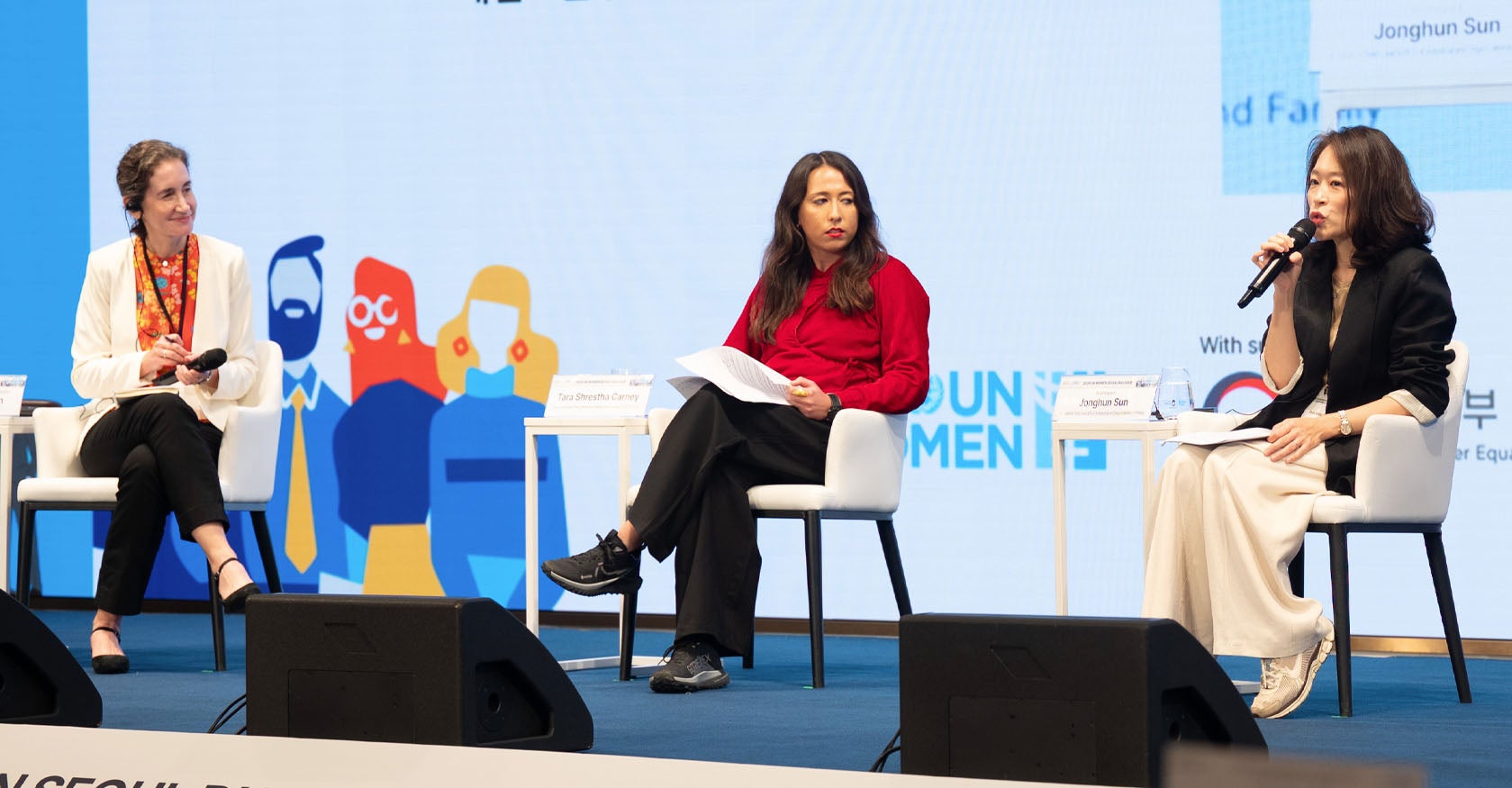
(from left) Janelle Weissman, Head of External Relations at UN Women Regional Office for Asia and the Pacific; Tara Shrestha Carney, Economist and Author of the PwC Women in Work Index (2019–2024); Jonghun Sun, DEI Initiative Team Lead at Root Impact and Ph.D. in Industrial and Organizational Psychology; and Fiona Lee, People Data Scientist at Pinterest (participating virtually). Photo: UN Women/Hwang Chang Kyu
In the Expert Presentations Session, led by Janelle Weissman, Head of External Relations at UN Women Regional Office for Asia and the Pacific, experts shared their latest research findings. Tara Shrestha Carney, Economist and Author of the PwC Women in Work Index (2019–2024), opened the session with a compelling presentation on the economic benefits of gender parity. "Closing the gender pay gap could increase total income for women across OECD countries by $2 trillion annually," she explained.
Fiona Lee, People Data Scientist at Pinterest, shared how women receive 22% more feedback focused on personality traits and are seven times more likely to receive negative feedback compared to men. Drawing from her research, she emphasized the importance of implementing behavior- and data-driven evaluation standards to ensure fair and equitable performance assessments.
Jonghun Sun, Root Impact DEI Initiative Team Lead, presented research demonstrating that skills gained through childcare and household responsibilities—such as communication and multitasking—equip mothers with valuable competencies essential for professional success. She advocated for redefining the qualities of a "good employee," emphasizing that women with career gaps due to caregiving should be recognized as “talent” rather than being perceived as having career interruptions.
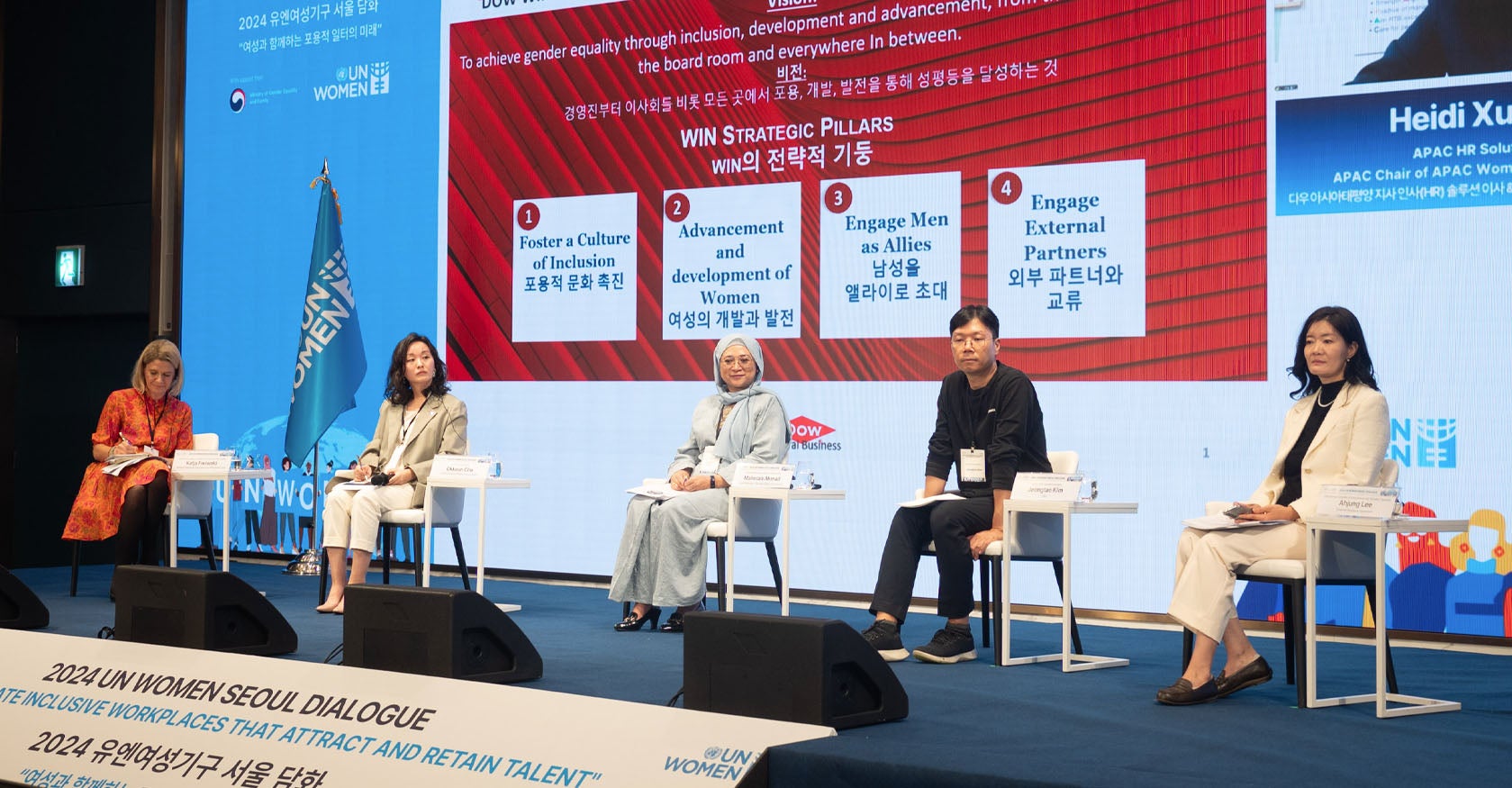
(from left) Katja Freiwald, Women's Economic Empowerment & Migration Lead, UN Women Regional Office for Asia and the Pacific; Okkeun Cho, Senior Manager, People Strategy Team, Lotte Group; Maheran Ahmad, Senior Manager, Diversity, Equity and Inclusion, Deloitte Southeast Asia & Asia Pacific; Jeongtae Kim, CEO, Merry Year Social Company; Ahjung Lee, External Relations Specialist, UN Women Centre of Excellence for Gender Equality (from the left); and Heidi Xu, APAC HR Solution Director & APAC Chair of Women Inclusion Network, Dow. Photo: UN Women/Hwang Chang Kyu
Following the two main sessions, two thematic workshops were held.
The first workshop, led by Katja Freiwald, Women's Economic Empowerment & Migration Lead at the UN Women Regional Office for Asia and the Pacific, explored effective DEI policy development and implementation, drawing on examples from Women’s Empowerment Principles (WEPs) signatories.
Jeongtae Kim, CEO of Merry Year Social Company (MYSC) in ROK, shared how his organization is using a WEPs-based pre-investment screening tool co-developed with the Centre. "We try to use our power and influence as an investor to set WEPs as a standard so that our investees become more committed to gender equality," he explained.
Okkeun Cho, Senior Manager of the People Strategy Team at Lotte Group, further elaborated on the philosophy behind Lotte’s long-term implementation of family-friendly policies and the importance of sustaining a policy over a long term.
Maheran Ahmad, Senior Manager for DEI at Deloitte Southeast Asia & Asia Pacific, presented how implementing DEI KPIs within the WEPs framework has provided clarity on the company’s progress and areas for improvement and thereby helped them create a better workplace culture.
Heidi Xu, APAC HR Solution Director and APAC Chair of the Women Inclusion Network at Dow, shared the company’s neutral interviewers initiative to reduce biases in recruitment and attract more diverse talent. This program ensures that all interview panels include a trained, neutral interviewer to promote inclusive interviewing and fair processes.
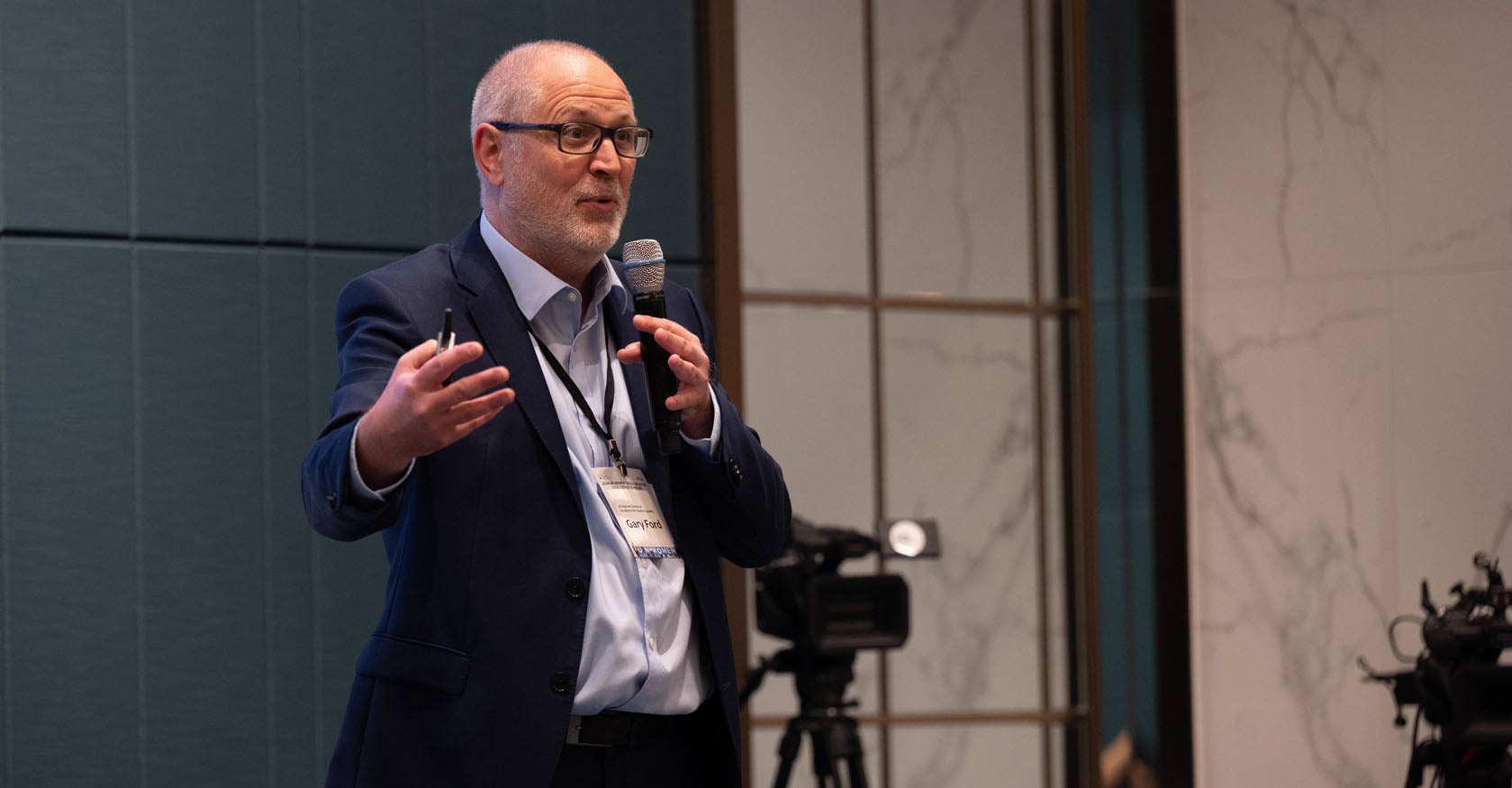
Gary Ford, Co-founder of Men for Inclusion explains inclusive team building. Photo: UN Women/Hwang Chang Kyu
The second workshop focused on inclusive leadership and team building, featuring Gary Ford, Co-founder of Men for Inclusion and Inclusive Leadership Consultant at the Centre. Drawing on compelling survey results, he illustrated how ‘accidental sexism’ persists across the private sector and stressed the critical need to foster an inclusive culture where everyone feels they have a fair opportunity to pursue the career they aspire to. He shared practical tips to help participants make conscious efforts to become inclusive leaders. “If you want your organization to be recognized as a leader in inclusive culture, you must take the lead personally,” he urged.





